
Sant Climent de Taüll, also known as the Church of St. Clement of Tahull, is a Roman Catholic church in Catalonia, Spain. It is an example of Romanesque architecture. Other influences include the Lombard and Byzantine styles, which can be seen throughout the exterior and interior of the building. The church is a basilica plan structure with three naves, each of them with a terminal apse, and large columns separating the side naves. Connecting to the church is a slim bell tower that has six floors plus a base. The artwork inside the church include the famous mural paintings by the Master of Taüll, as well as the wooden altar frontal. These works of art represent different aspects of Christianity that can also be found in many other works of art. The most famous fresco, of Christ in Majesty in the main apse of the church, has been moved to the Museu Nacional d'Art de Catalunya in Barcelona.
The Churches of the Vall de Boí are a set of nine Early Romanesque churches declared World Heritage Site by UNESCO and located in the Vall de Boí, in the Catalan comarca of Alta Ribagorça.

The Altar frontal from La Seu d'Urgell or of The Apostles is a Romanesque altar frontal currently exhibited at the National Art Museum of Catalonia, Barcelona, Spain. The work dates from the second quarter of the 12th century and comes from a church of the Bishop of La Seu d'Urgell and was acquired in 1905. It is one of the masterpieces of the collection of panel painting of the MNAC. The frontal, the item covering the front of the altar, stands out for the quality of its bright colours and because it illustrates some of the characteristics of composition in Romanesque art, such as bilateral symmetry, abstraction of the background, with no reference to space or context, and the unnatural geometrical treatment of form to be observed in the folds of the clothing. It also shows certain conventions of representation, such as so-called hierarchical perspective, which consists in representing the chief character in a larger size.

The Saint Augustine Altarpiece is a Catalan Gothic painting in egg tempera by Jaume Huguet and Pau Vergós made between 1462 and 1475. The long duration of the work was caused by financial reasons, and it is assumed that work was begun by Huguet and finished by other members of his workshop, in particular Pau Vergós. The altarpiece was commissioned by the guild of tanners to be placed on the altar of the Augustinian friary of Sant Agustí Vell in Barcelona, Spain. The panel measures 250 × 193 × 9.5 cm and has been in the Museu Nacional d'Art de Catalunya (MNAC) in Barcelona since 1927.

Desolation is a sculpture that was crafted by Josep Llimona in 1907, which now resides in the National Art Museum of Catalonia in Barcelona.

The Southern apse from Pedret is a Romanesque fresco painting from late 11th century or the beginning of the 12th century, which was acquired during the 1919-1923 campaign of the Junta de Museus. The artwork originated from the southern apsidiole of the Church of Sant Quirze de Pedret and is currently exhibited in the Romanesque Art collection at the Museu Nacional d'Art de Catalunya, in Barcelona, Spain.

The Apse of Sant Climent de Taüll is a Romanesque fresco in the National Art Museum of Catalonia, Barcelona. The fresco is one of the masterpieces of the European Romanesque, from which the unknown Master of Taüll takes his name. It was painted in the early 12th century in the church of Sant Climent de Taüll in the Vall de Boí, Alta Ribagorça in the Catalan Pyrenees. The mural covered the apse of the church. In 1919-1923 it was moved, along with other parts of the fresco decoration, to Barcelona, in an attempt to preserve the murals in a stable, secure museum setting.

Erill la Vall Descent from the Cross is a set of seven 12th-century wooden sculptures from the Pyrenees village of Erill la Vall in Catalonia. Originally painted, it comprises a complete Romanesque Descent from the Cross sculpture group, which in Catalonia has the peculiarity that it is made up of seven figures. Two of the carvings are kept at the National Art Museum of Catalonia (MNAC) and the rest at the Vic Episcopal Museum.

The Virgin of the Angels is a painting by Pere Serra conserved at the National Art Museum of Catalonia.
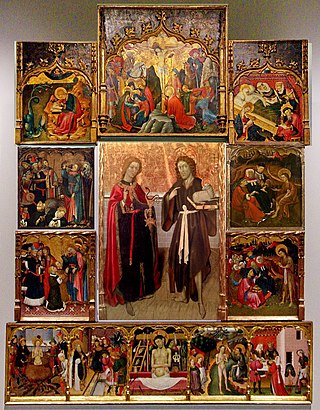
The Altarpiece of the Saints John is a painting by Bernat Martorell conserved at the National Art Museum of Catalonia.

Resurrection is a painting by Bartolomé Bermejo conserved at the National Art Museum of Catalonia.
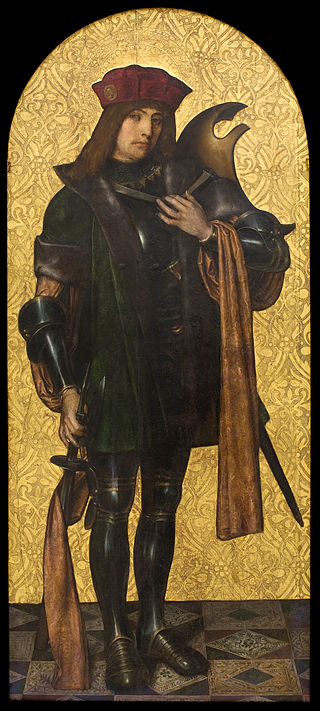
Saint Candidus is a painting by Ayne Bru, conserved at the National Art Museum of Catalonia.

The Immaculate Conception is a painting by Francisco de Zurbarán, executed in 1632, conserved at the National Art Museum of Catalonia.

The Martyrdom of Saint Bartholomew is a painting by Jusepe de Ribera conserved at the National Art Museum of Catalonia.

The Mural Paintings from the Herrera Chapel is a group of mural paintings by Annibale Carracci and collaborators, of around 1602, now divided between the National Art Museum of Catalonia in Barcelona, and the Museo del Prado in Madrid.

The Gothic altarpiece of Santes Creus is an altarpiece painted by Guerau Gener and Lluís Borrassà between 1407 and 1411. It is one of the key works of the International Gothic altarpieces in Catalonia, created for the Santes Creus Monastery. The MNAC museum retains the Nativity, crowned by the figure of St. John the Evangelist, and the Resurrection of Christ, while the rest of the tables are kept in one of the chapels of the cathedral of Tarragona. The altarpiece was commissioned to Pere Serra but apparently died without starting it. Guerau Gener, a connoisseur of València international Gothic, replaced him, but his untimely death made Lluís Borrassà, one of the major figures in the painting of the first international Catalan Gothic, to complete the project.

The Paintings from Sant Joan in Boí is a group of Catalan Romanesque paintings exhibited at the National Art Museum of Catalonia in Barcelona.
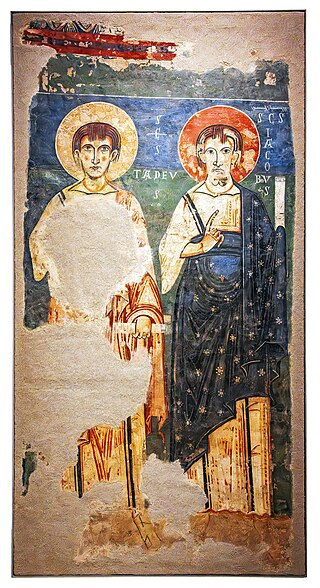
The Apostles from Àger is a painting created in the late 11th century or early 12th century, currently exhibited at the National Art Museum of Catalonia in Barcelona.
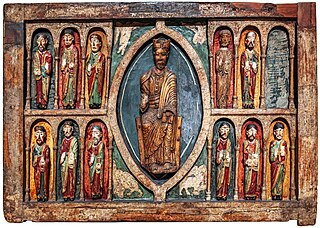
The Altar frontal from Santa Maria in Taüll is an altar frontal exhibited at the National Art Museum of Catalonia in Barcelona.
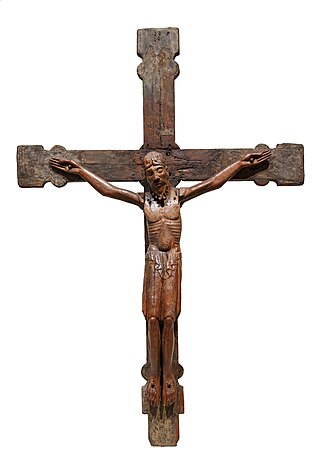
The Christ from 1147 is a Catalan wood sculpture from the 12th-century, exhibited at the National Art Museum of Catalonia in Barcelona.




















